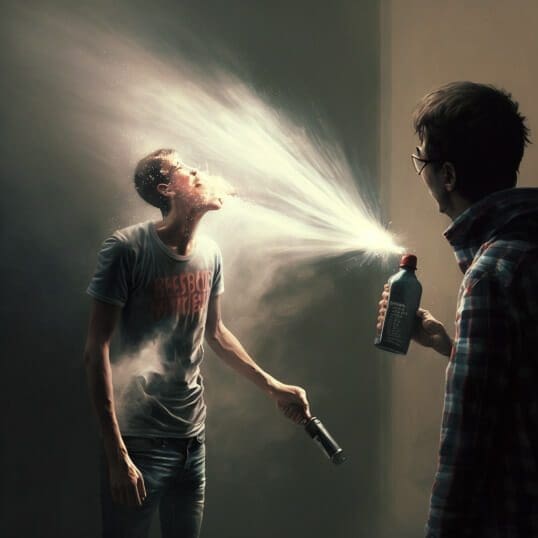Can You Use Bear Spray on Humans for Self Defense
In recent years, self-defense has become an increasingly important topic for many people. One question that often arises is whether or not bear spray can be used on humans in self-defense situations. As an outdoor enthusiast, I have encountered various scenarios where having a deterrent like bear spray could mean the difference between safety and harm.
While bear spray is specifically designed for use against aggressive bears, its effects on humans are not to be underestimated. According to Persurvive, bear spray can cause temporary pain, irritation, and discomfort to a person, similar to the effects of pepper spray. However, it’s important to note that using bear spray on humans may not be explicitly illegal, but one could face legal consequences if it’s not used in an appropriate self-defense situation, as mentioned on National Parks Backpacker.
Understanding Bear Spray
Composition and Effects
In my experience, bear spray is a powerful deterrent designed to protect people from potential bear attacks. It contains capsaicin and related capsaicinoids, which are derived from chile peppers. These compounds create a potent burning sensation and can cause temporary pain, irritation, and discomfort to both bears and humans when sprayed in their eyes, nose, and mouth (PerSurvive).
I have learned that it is crucial to use bear spray promptly in a situation where a bear is approaching, as it creates a cloud of irritant between the person and the bear, giving the individual time to put distance between themselves and the animal (TripSavvy). While bear spray is effective on humans in cases of self-defense, it should be used as a last resort, since its primary purpose is to deter bears.
Differences from Pepper Spray
It’s important to note that bear spray and pepper spray are not the same. The most significant difference I’ve observed is that bear spray has a much higher concentration of capsaicin and related capsaicinoids compared to personal self-defense pepper spray products. This higher concentration means that bear spray may cause more pain and irritation to humans, although it’s still potent enough to create a meaningful deterrent for aggressive bear encounters (PerSurvive).
Another difference is that bear sprays typically come in larger canisters and disperse over a greater distance, making them more suitable for dealing with an approaching bear (OutdoorMeta).
While using bear spray on humans for self-defense may be legally allowed in certain circumstances, it’s essential to remember that the Environmental Protection Agency (EPA) regulates bear spray as a pesticide intended only for use on bears (LegalProX). Therefore, it is crucial to exercise caution and use bear spray appropriately to stay within the confines of the law.
Legality and Regulations
Bear Spray Laws
As a person who frequently ventures outdoors, I find it essential to understand the laws regarding using bear spray on humans for self-defense. In the United States, using bear spray on humans may not be explicitly prohibited, but laws can still apply depending on the situation and intent of the user (National Parks Backpacker). For instance, using bear spray on others without justifiable self-defense reasons, such as in pranks, can lead to legal consequences.
In Canada, the situation is different. While bear spray is legal when carried for protection against bear attacks, using it on humans is considered a criminal offense, and I should be prepared to face a fine if I do so (LACHRYMATORS.COM).
Potential Consequences
Aside from the legal consequences, there are safety risks associated with using bear spray on humans. Bear sprays have a much higher volume compared to normal pepper sprays, which are meant for human self-defense (National Parks Backpacker). It’s important for me to keep in mind that misuse of bear spray could potentially cause severe injuries to the targeted person.
Moreover, I should always ensure that I am using appropriate spray products in each situation. While bear spray may be effective against bears due to their strong sense of smell, personal defense pepper sprays are typically the better option for self-defense against humans, as their size and potency are more suitable for human use (Quora).
Safety and Precautions
Physical Risks
Though bear spray can indeed be used on humans for self-defense, it is essential to understand the potential risks. The active ingredient in bear spray is capsaicin, which can cause significant burning and inflammation of the mucous membranes when sprayed in the face (StaySafeDiary). Since my intention is to protect myself and not cause lasting harm, I need to be aware of the potential risks.
Here are some key points to consider:
- Bear spray can have a more potent concentration of capsaicin than regular pepper spray, which may lead to stronger effects on the attacker.
- Overuse of bear spray can cause respiratory distress, which can become dangerous in certain situations.
- There is a risk of backlash or cross-contamination, meaning I can accidentally be affected by the spray if not used carefully.
Environmental Considerations
Beyond the physical effects of using bear spray on humans, there are environmental considerations to take into account. The Environmental Protection Agency (EPA) regulates bear spray as a pesticide, specifically designed for use on bears and not humans or other animals (LegalProX). As someone who cares about the environment, I want to ensure that I’m using products that are safe and won’t contribute to any negative impacts.
To minimize potential environmental risks, here are some precautions I can take:
- Use bear spray only when necessary, and do not use it on other animals or humans who don’t pose a direct threat.
- Ensure proper disposal of used bear spray canisters to prevent contamination of the environment.
- Consider alternatives such as personal alarms or traditional pepper spray, which may have less environmental impact.
Alternatives for Self Defense
While it’s possible to use bear spray on humans for self-defense, there are other effective alternatives to consider. In this section, I’ll discuss three popular self-defense options: pepper spray, personal alarms, and self-defense classes.
Pepper Spray
Pepper spray is an excellent alternative to bear spray for self-defense against humans. It contains a concentrated solution of capsaicin, an irritant found in chili peppers, which causes significant eye pain, temporary blindness, and breathing difficulties when used correctly. Unlike bear spray, which is designed for deterring bears, pepper spray is specifically intended for use on human attackers.
Personal Alarms
Personal alarms are another effective option for self-defense. These devices emit a loud, piercing sound that can alert nearby people or authorities to your situation, potentially scaring off an attacker. Most personal alarms are small and portable, making them easy to carry with you at all times. Some models even come equipped with additional features, such as flashing lights or the ability to send a GPS signal to your emergency contacts.
Self Defense Classes
Learning self-defense techniques can be an empowering and practical solution for personal safety. Self-defense classes teach valuable skills such as awareness, assertiveness, and physical techniques that can help fend off an attacker. Many communities offer self-defense classes — some specifically designed for women, seniors, or other particular groups. Additionally, there are online resources and instructional videos available to learn self-defense techniques.
In conclusion, while bear spray can be used on humans for self-defense, it is important to consider alternative options such as pepper spray, personal alarms, and self-defense classes. Each of these alternatives offers a different approach to personal safety, allowing you to choose the one that best suits your needs and preferences.
Conclusion
In my research, I’ve discovered that using bear spray on humans may not be explicitly prohibited by law, but it is highly unsafe and not recommended. It can result in arrest or legal action if it’s not used in self-defense. Bear sprays are designed for bear encounters and have a higher concentration than standard pepper sprays intended for human assailants.
While bear spray has proven effective at deterring bears, its use on humans can have dangerous consequences. It’s important to remember that the EPA regulates bear spray as a pesticide, and its intended use is strictly on bears. I’ve learned that there is a clear distinction between bear spray and pepper spray, and they should not be used interchangeably unless needed.
Ultimately, for self-defense against human attackers, it’s best to rely on pepper spray, which is specifically designed for this purpose. This approach ensures both legal compliance and personal safety. Remember, bear spray should only be used for encounters with bears and not for self-defense against humans if possible.








